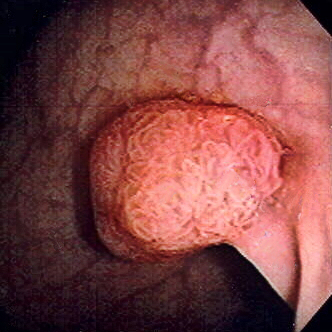Polyp (medicine)
Editor-In-Chief: Prab R Tumpati, MD
Obesity, Sleep & Internal medicine
Founder, WikiMD Wellnesspedia &
W8MD medical weight loss NYC and sleep center NYC
| Polyp | |
|---|---|

| |
| Synonyms | |
| Pronounce | N/A |
| Specialty | N/A |
| Symptoms | Often asymptomatic, but can include rectal bleeding, abdominal pain, and changes in bowel habits |
| Complications | Colorectal cancer |
| Onset | Varies |
| Duration | Varies |
| Types | N/A |
| Causes | Genetic factors, inflammatory conditions, dietary factors |
| Risks | Age, family history, smoking, obesity |
| Diagnosis | Colonoscopy, sigmoidoscopy, barium enema, CT colonography |
| Differential diagnosis | Hemorrhoids, diverticulosis, colorectal cancer |
| Prevention | Regular screening, healthy diet, exercise |
| Treatment | Polypectomy, endoscopic mucosal resection, surgery |
| Medication | N/A |
| Prognosis | Generally good if detected early |
| Frequency | Common, especially in adults over 50 |
| Deaths | N/A |
A polyp is an abnormal growth of tissue projecting from a mucous membrane. Polyps are commonly found in organs with a large surface area of mucous membrane, such as the colon, stomach, nose, sinuses, urinary bladder, and uterus. While most polyps are benign, some can develop into cancer.
Types of Polyps
Polyps can be classified based on their histological appearance and their potential for malignancy.
Colorectal Polyps
Colorectal polyps are growths on the lining of the colon or rectum. They are common in adults and can be classified into several types:
- Adenomatous polyps: These are the most common type of polyp and have the potential to become cancerous. They are further divided into tubular, tubulovillous, and villous types.]]
- Hyperplastic polyps: These are usually small and have a low risk of becoming cancerous.]]
- Sessile serrated adenomas: These polyps have a saw-tooth appearance under the microscope and can develop into cancer if not removed.]]
]]
Gastric Polyps
Gastric polyps are found in the stomach and can be classified into several types:
- Fundic gland polyps: These are the most common type of gastric polyp and are usually benign.]]
- Hyperplastic polyps: These are associated with chronic inflammation and have a low risk of malignancy.]]
- Adenomatous polyps: These are less common but have a higher risk of becoming cancerous.]]
Other Types of Polyps
Polyps can also occur in other parts of the body, such as the nasal cavity, sinuses, bladder, and uterus. Each type of polyp has its own characteristics and potential for malignancy.
Diagnosis and Treatment
Polyps are often diagnosed during routine screening procedures such as colonoscopy or endoscopy. Once identified, polyps can be removed and examined histologically to determine their type and potential for malignancy.
- Colonoscopy: A procedure used to examine the interior of the colon and rectum, often used to detect and remove polyps.
- Endoscopy: A procedure used to examine the interior of a hollow organ or cavity of the body, such as the stomach or bladder.
See also
Transform your life with W8MD's budget GLP-1 injections from $125.
W8MD offers a medical weight loss program to lose weight in Philadelphia. Our physician-supervised medical weight loss provides:
- Most insurances accepted or discounted self-pay rates. We will obtain insurance prior authorizations if needed.
- Generic GLP1 weight loss injections from $125 for the starting dose.
- Also offer prescription weight loss medications including Phentermine, Qsymia, Diethylpropion, Contrave etc.
NYC weight loss doctor appointments
Start your NYC weight loss journey today at our NYC medical weight loss and Philadelphia medical weight loss clinics.
- Call 718-946-5500 to lose weight in NYC or for medical weight loss in Philadelphia 215-676-2334.
- Tags:NYC medical weight loss, Philadelphia lose weight Zepbound NYC, Budget GLP1 weight loss injections, Wegovy Philadelphia, Wegovy NYC, Philadelphia medical weight loss, Brookly weight loss and Wegovy NYC
|
WikiMD's Wellness Encyclopedia |
| Let Food Be Thy Medicine Medicine Thy Food - Hippocrates |
Medical Disclaimer: WikiMD is not a substitute for professional medical advice. The information on WikiMD is provided as an information resource only, may be incorrect, outdated or misleading, and is not to be used or relied on for any diagnostic or treatment purposes. Please consult your health care provider before making any healthcare decisions or for guidance about a specific medical condition. WikiMD expressly disclaims responsibility, and shall have no liability, for any damages, loss, injury, or liability whatsoever suffered as a result of your reliance on the information contained in this site. By visiting this site you agree to the foregoing terms and conditions, which may from time to time be changed or supplemented by WikiMD. If you do not agree to the foregoing terms and conditions, you should not enter or use this site. See full disclaimer.
Credits:Most images are courtesy of Wikimedia commons, and templates, categories Wikipedia, licensed under CC BY SA or similar.
Contributors: Prab R. Tumpati, MD







